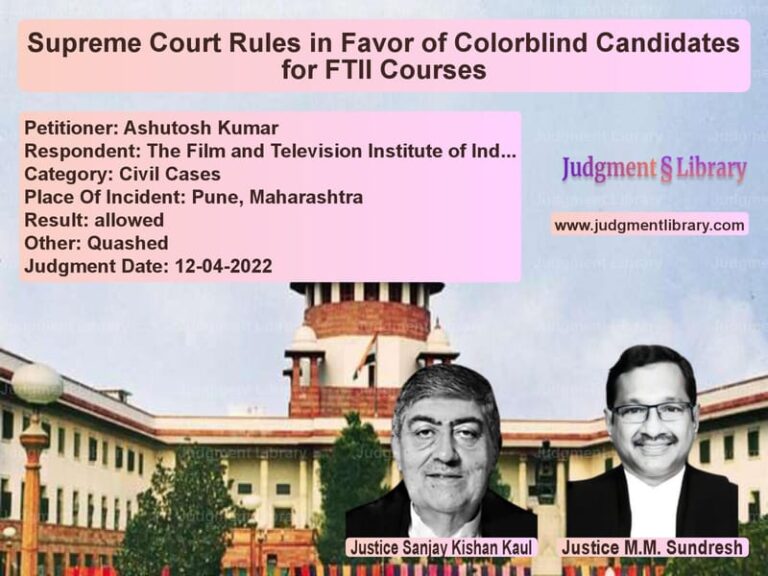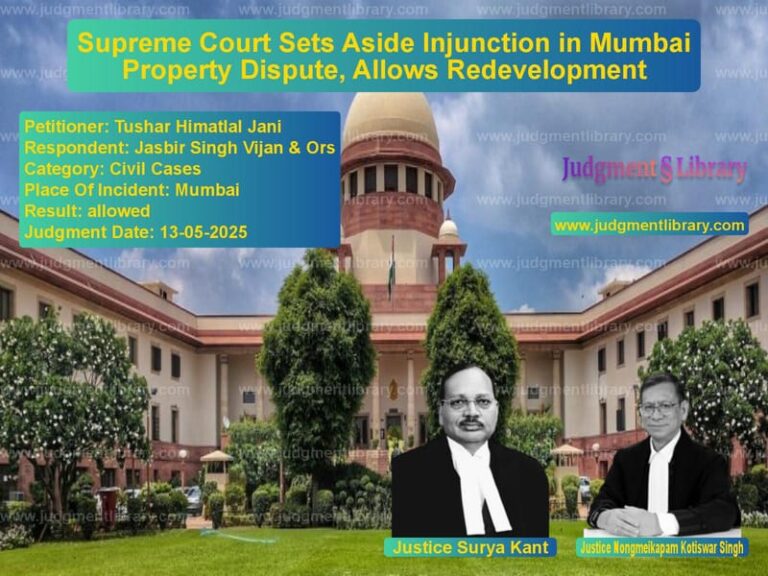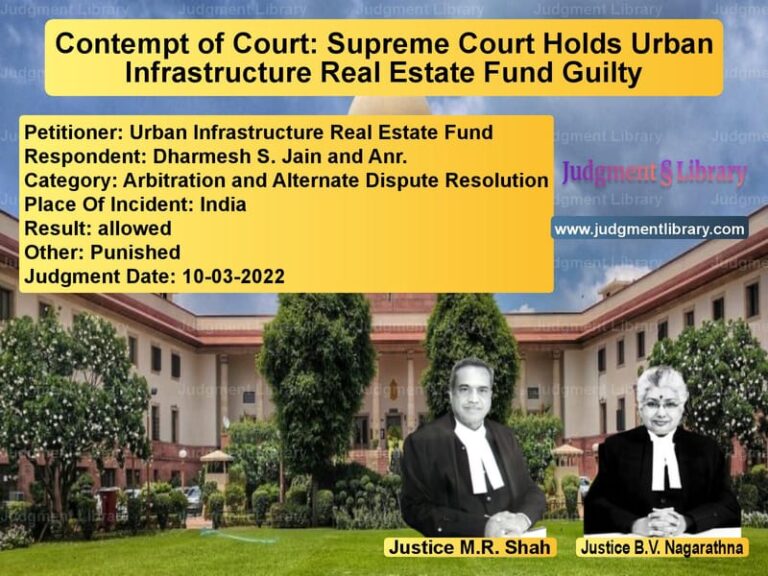CBI Director Alok Kumar Verma’s Removal: Supreme Court Ruling on Institutional Autonomy
The Supreme Court’s judgment in the case of Alok Kumar Verma vs. Union of India & Anr. is a landmark decision on the autonomy of investigative agencies in India. The Court addressed the legality of the government’s move to divest Verma, then Director of the Central Bureau of Investigation (CBI), of his powers, and the necessity of maintaining institutional independence.
Background of the Case
On October 23, 2018, the Central Vigilance Commission (CVC) passed an order relieving Alok Kumar Verma of his responsibilities as the Director of the CBI, following allegations of corruption and administrative irregularities. The government promptly accepted this recommendation, appointing M. Nageshwar Rao as the interim chief.
Verma challenged this decision, arguing that it was politically motivated and in violation of the Delhi Special Police Establishment Act (DSPE Act), which grants statutory protections to the CBI Director. His petition raised key concerns about the executive’s authority over investigative agencies and whether statutory safeguards could be bypassed.
Legal Issues Raised
- Whether the CVC and the government had the legal authority to remove or transfer the CBI Director without consulting the selection committee.
- Whether the removal order violated Section 4B of the DSPE Act, which guarantees a minimum tenure for the CBI Director.
- Whether the government’s actions amounted to political interference in the functioning of the CBI.
Arguments by the Petitioner
Alok Kumar Verma and his counsel contended:
“The legislative intent behind granting a fixed tenure to the CBI Director was to insulate the office from political pressures. The government’s order bypassed statutory safeguards and effectively undermined the independence of the institution.”
His arguments were based on the following points:
- The DSPE Act explicitly states that the CBI Director cannot be removed or transferred before completing a two-year tenure without the prior approval of the high-powered selection committee.
- The allegations against Verma were unsubstantiated and could not justify such drastic action.
- The move set a dangerous precedent that could allow the executive to undermine independent agencies at will.
- By removing Verma overnight and appointing an interim chief, the government had interfered in ongoing sensitive investigations.
Arguments by the Respondent
The Union of India, defending its decision, argued:
“The CVC has plenary powers to act against the Director of CBI in cases of misconduct. The decision was taken in the interest of maintaining institutional integrity.”
The government justified its actions on the following grounds:
- The CBI was embroiled in internal conflicts, with allegations and counter-allegations between Verma and Special Director Rakesh Asthana.
- The crisis had paralyzed the agency, and immediate intervention was necessary to restore normalcy.
- The CVC was empowered to recommend such action in extraordinary circumstances.
- The Supreme Court had previously held that integrity in investigative agencies is paramount, and actions to uphold it should not be viewed as interference.
Supreme Court’s Observations
Chief Justice Ranjan Gogoi, delivering the judgment, emphasized:
“The legislative intent in bringing the provisions to the statute book is for ensuring complete insulation of the office of the Director, CBI from all kinds of extraneous influences.”
The Court ruled that:
- Any decision to remove or transfer the CBI Director before the completion of the tenure must have the approval of the statutory selection committee.
- The government and the CVC had acted without such approval, rendering the decision legally unsustainable.
- The Director of the CBI cannot be subjected to executive whims; procedural safeguards must be strictly adhered to.
The Court noted:
“The actions of the respondents undermine the very foundation on which the CBI’s autonomy rests. The principle of fixed tenure is not an empty formality; it serves a critical role in ensuring the agency’s independence.”
Final Judgment
The Supreme Court ruled:
“The orders dated 23.10.2018, divesting the petitioner of his functions, duties, and powers, are hereby quashed. The petitioner is reinstated as the Director, CBI.”
The Court directed that any decision regarding Verma’s further tenure must be taken by the selection committee.
Implications of the Judgment
- Reaffirmation of CBI’s Autonomy: The ruling affirms that investigative agencies must remain independent from executive interference.
- Clear Guidelines on Removal of Officials: The Court clarified that statutory provisions protecting tenure cannot be bypassed by executive orders.
- Judicial Oversight on Administrative Actions: The judgment strengthens the role of judicial review in protecting constitutional principles.
- Impact on Future Appointments: The decision sets a precedent that ensures the selection and removal of key officials follow due process.
Conclusion
The Supreme Court’s ruling in the Alok Kumar Verma case is a milestone in preserving institutional integrity. By reinforcing statutory safeguards, the Court has sent a strong message against arbitrary executive actions that threaten investigative autonomy. The judgment upholds the rule of law and ensures that investigative agencies function without undue influence.
Petitioner Name: Alok Kumar Verma.Respondent Name: Union of India & Anr..Judgment By: Justice Ranjan Gogoi, Justice Sanjay Kishan Kaul, Justice K.M. Joseph.Place Of Incident: New Delhi.Judgment Date: 08-01-2019.
Don’t miss out on the full details! Download the complete judgment in PDF format below and gain valuable insights instantly!
Download Judgment: Alok Kumar Verma vs Union of India & Anr Supreme Court of India Judgment Dated 08-01-2019.pdf
Direct Downlaod Judgment: Direct downlaod this Judgment
See all petitions in Fundamental Rights
See all petitions in Public Interest Litigation
See all petitions in Separation of Powers
See all petitions in Constitution Interpretation
See all petitions in Judgment by Ranjan Gogoi
See all petitions in Judgment by Sanjay Kishan Kaul
See all petitions in Judgment by K.M. Joseph
See all petitions in allowed
See all petitions in supreme court of India judgments January 2019
See all petitions in 2019 judgments
See all posts in Constitutional Cases Category
See all allowed petitions in Constitutional Cases Category
See all Dismissed petitions in Constitutional Cases Category
See all partially allowed petitions in Constitutional Cases Category







